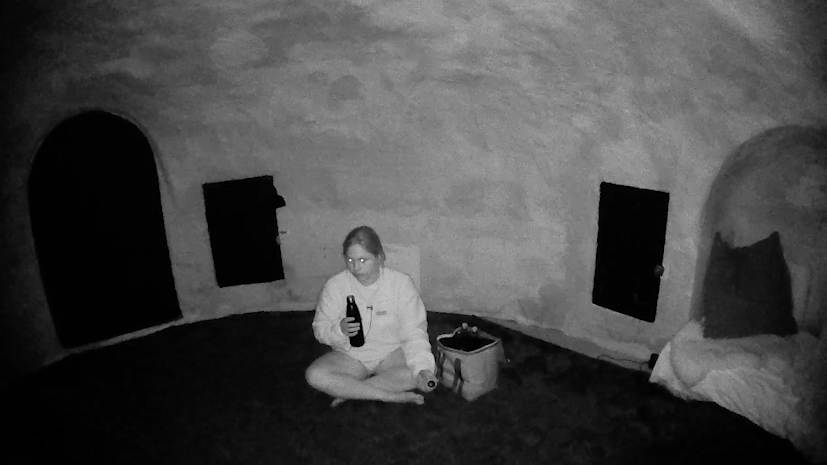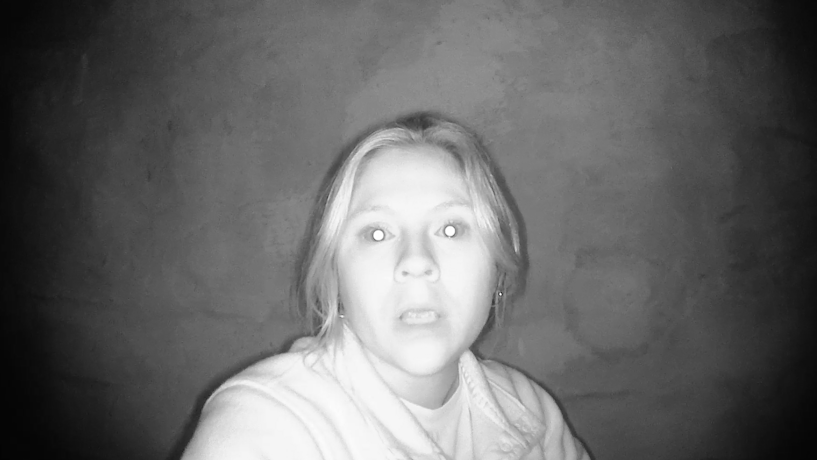Days in complete darkness: What it's like to visit an underground retreat in Quebec
 Noovo Info reporter Beatrice Roy-Brunet spent hours in complete darkness at a retreat in Quebec's Eastern Townships. (Source: Noovo Info)
Noovo Info reporter Beatrice Roy-Brunet spent hours in complete darkness at a retreat in Quebec's Eastern Townships. (Source: Noovo Info)
Would you spend up to $1,200 to stay in absolute darkness for three to seven days? That's the invitation from a meditation teacher and personal growth entrepreneur in Quebec's Eastern Townships.
It's an increasingly popular practice with little supervision, and experts warn of potential health risks.
Noovo Info reporter Béatrice Roy-Brunet went to the retreat to try the practice and report on her experience. The French-;anguage news outlet granted the retreat's owner anonymity.
Followers of the practice praise the benefits of isolating in the dark: "bursts of creativity," "significant healings," and "unforgettable psychic experiences."
The practice is slowly taking root in Quebec, with a handful of darkrooms operating in and around Montreal. Elsewhere in the world, however, it has been gaining in popularity for several years.
In the Czech Republic, psychologist Marek Malus has been investigating the potential benefits of darkness since 2011.
According to him, "a 24-hour stay is sufficient to relieve stimulus overload, to improve memory as well as cognitive and behavioural flexibility."
A stint in the dark could also boost self-esteem, reduce anxious or depressive experiences or even improve physical fitness, said the researcher.
DIVE INTO DARKNESS
Roy-Brunet describes her first impression of the retreat as a small underground cave.
She was shown to a small chamber with a bed, where she would spend the next 24 hours in total darkness.
The initial aim was to complete the full multi-day experience, but that plan was scaled back in light of information from health experts, Roy-Brunet reports.
"The humidity is palpable as you walk through the door. A dry toilet is located in the entrance corridor. A strong smell of urine emanates from it. I was also provided with a lunch box, the contents of which I would discover in the dark," said Roy-Brunet.
With her cell phone taken away, there was no way of contacting the outside world from inside the concrete room.
There was one light, which Roy-Brunet says she turned on occasionally to control her fear.
"As I tried to sleep through my experiment, green shapes seemed to come to life under my eyelids, preventing me from relaxing. I think I even saw a shadow moving towards me at high speed," she said.
The retreat does not have the required permits to operate, according to the municipality where it's located.
 Noovo Info reporter Beatrice Roy-Brunet spent hours in complete darkness at a retreat in Quebec's Eastern Townships. (Source: Noovo Info)
Noovo Info reporter Beatrice Roy-Brunet spent hours in complete darkness at a retreat in Quebec's Eastern Townships. (Source: Noovo Info)
HALLUCINATIONS AND ANXIETY
These hallucinations are part of a well-known mechanism in cognitive neuroscience, explains Dave Saint-Amour, a professor in the department of psychology at the Université du Québec à Montréal and co-founder of UQAM's research centre on cognitive neuroscience.
Essentially, the brain adapts to the suppression of visual information. "The consequence of this is that there will be an increase in activity in the visual cortex, even in the absence of vision," he continues.
This increase in brain activity can be interpreted as the cause of a real object. In total darkness, it's a hallucination.
"Hallucinations are generally positive or neutral. Sometimes, they can be negative," he said.
While the experience does not have a long-term effect, the hallucinations increased Roy-Brunet's discomfort in the dark.
"During my few hours of isolation, I felt anxious, which is not usual for me. I hadn't been informed of this possibility by the organizers," she reported.
For Dr. Christine Grou, clinical psychologist and president of Quebec's Order of Psychologists, this type of retreat carries risks for the psychological health of participants and should raise "red flags."
"For some people, it can even lead to hallucinations or more serious behavioural disorganization," she notes.
Even Czech researcher Marek Malůš asserts those offering such services must be well-trained to handle potential reactions from participants.
He cites studies that suggest traumatic or repressed experiences can resurface in such a context. Full training in psychotherapy would therefore be necessary, in his view, to avoid re-traumatization.
EXPERIENCE IS FOR 'INFORMED PUBLIC': OWNER
In light of this information, Noovo Info contacted the owner to present the doubts raised by the experts.
The owner says he was not trained in psychotherapy.
"I've been a meditation teacher for 20 years. I still understand this kind of process, often more than someone who has been trained in a university," he said.
He also argues that it's not an experience offered to the general public. Yet a Facebook page exists, and a simple Google search leads directly to the place's website.
"It's for an informed public," he replies. Maybe it's a subject I have to keep even more discreet."
- With files from Noovo Info's Béatrice Roy-Brunet
CTVNews.ca Top Stories

W5 Investigates A 'ticking time bomb': Inside Syria's toughest prison holding accused high-ranking ISIS members
In the last of a three-part investigation, W5's Avery Haines was given rare access to a Syrian prison, where thousands of accused high-ranking ISIS members are being held.
'Mayday!': New details emerge after Boeing plane makes emergency landing at Mirabel airport
New details suggest that there were communication issues between the pilots of a charter flight and the control tower at Montreal's Mirabel airport when a Boeing 737 made an emergency landing on Wednesday.
Class-action lawsuit on 'opioid-related wrongs': Court to rule on drug companies' appeal
Canada's top court will rule Friday on the appeal of a class-action lawsuit meant to recoup some of the costs associated with British Columbia's opioid crisis from major drug makers and distributors.
Real GDP per capita declines for 6th consecutive quarter, household savings rise
Statistics Canada says the economy grew at an annualized pace of one per cent during the third quarter, in line with economists' expectations.
Cucumbers sold in Ontario, other provinces recalled over possible salmonella contamination
A U.S. company is recalling cucumbers sold in Ontario and other Canadian provinces due to possible salmonella contamination.
Irregular sleep patterns may raise risk of heart attack and stroke, study suggests
Sleeping and waking up at different times is associated with an increased risk of heart attack and stroke, even for people who get the recommended amount of sleep, according to new research.
Nick Cannon says he's seeking help for narcissistic personality disorder
Nick Cannon has spoken out about his recent diagnosis of narcissistic personality disorder, saying 'I need help.'
California man who went missing for 25 years found after sister sees his picture in the news
It’s a Thanksgiving miracle for one California family after a man who went missing in 1999 was found 25 years later when his sister saw a photo of him in an online article, authorities said.
As Australia bans social media for children, Quebec is paying close attention
As Australia moves to ban social media for children under 16, Quebec is debating whether to follow suit.


































